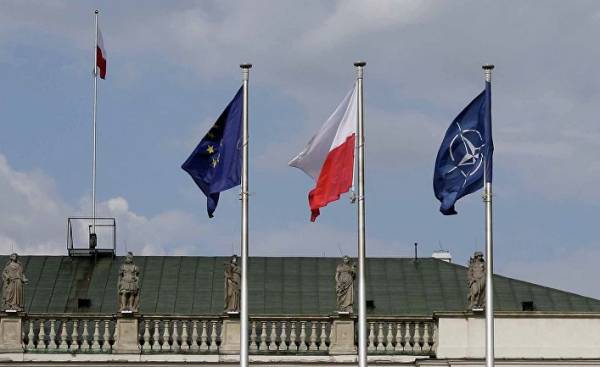
In late February, without fanfare, passed the next last date by which Poland had to comply with the requirements of the European Commission and to put in order its reform of the constitutional court. Of particular significance this event did not attach neither the world media nor even the Polish government — a deadline have been the third or fourth year. Polish foreign Minister Waszczykowski contented himself modestly predicted that now “the question will be closed.” And in this forecast it is difficult to argue.
For a year the leadership of the European Union regularly denounced Poland for authoritarian tendencies, threatened with terrible punishments, and one after another exhibited Warsaw deadlines, to which all this disgrace it is necessary to eliminate. The Polish government in response did not bother to even symbolic concessions and quietly walking track, crushing all the new institutions. It seemed that a collision is imminent. That taught the Hungarian experience Brussels will not allow the same thing was repeated in the largest country in the Eastern part of the EU. But anticipation was in vain. Brussels first, he clocked up expectations to the limit, and then waved his hand and quietly retreated, and deciding not to do anything.
Role reversal
Initially, there was little to suggest such an ignominious end. European officials have looked very strongly. They quickly responded to the events in Poland have consistently emphasized the unprecedented nature of the events and prudently increased the stiffness of the rhetoric from one missed deadline to another. In the meantime, Brussels has actively supported the global media: the Polish authorities and society had to be terrified and come to your senses, seeing that for the first time in many decades they were on the front pages, not as defenders of freedom, as her persecutors. It is in Russia had long been accustomed to his negative image in the Western media, but for poles this change was really a shock.
Cost of a new nationalist-conservative leadership of Poland to start something to tweak in the constitutional court at the end of 2015, as a month, at the beginning of January 2016, the European Commission announced that it begins against Warsaw the verification procedure of the rule of law. And not just starts, and for the first time in the history of the European Union. Poland was presented as the first EU country that brought Brussels to such drastic measures, though the point here was that the procedure for this check appeared in the European legislation only in 2014 — to apply it to Hungary was already late, and other cases to Poland was not presented.
If anyone had hoped that the process will drown in endless red tape of Brussels, then nothing. Already by 1 June, the European Commission has finished checking and has prepared a conclusion that the Polish reform of the constitutional court violates the principles of separation of powers and the rule of law. From Warsaw demanded to take it all back. And in July the first Deputy Chairman of the European Commission Timmermans has even clearly marked the date by which Poland must comply with the requirements — only three months. That last doubts have disappeared in the seriousness of Brussels.
The October deadline, the Commission somehow missed, but in December fell to Warsaw with very specific threats. Or Poland for two months meets the requirements of the EU’s Constitutional court, or Brussels use the “nuclear option” — to impose sanctions and deprive the poles the right to vote in the European Council.
The Polish government throughout the conflict showed, as it seemed, a dangerous levity. On the summer deadline they replied, just sending to Brussels the explanation that all the reforms taking place in Poland in the framework of European legislation. In October the Prime Minister Szydlo portrayed surprise that the European Commission is still reason does the Polish question, although Warsaw they clearly said that all the law. The December threats Timmermans about the “nuclear option” was accompanied by the final defeat of the constitutional court.
Well, the February deadline passed almost in silence. Warsaw has made it clear that he considers the matter closed. But the Commission could not, for the fourth time to extend the time, so just Timmermans promised to discuss the Polish question with other EU countries. It is clear that the EU now not to Poland and from these discussions it is unlikely that will happen.
The Warsaw logic
Role reversal happened fast. Here a couple of months ago a terrible and mighty, the European Commission was fair to punish zabyvshiesya Poland, turning it into a pariah state. But today, the calm, victorious Poland does not consider it necessary to comment on the next deadline of the European Commission, and she quietly retire, never venturing into the real action. Instead of trying to turn the Polish case in a good example to other countries that European rules not to be trifled, Brussels too carried away with a bluff and showed exactly the reverse: the European Commission can be safely ignored, it is still helpless and not do anything.
In the conflict around the Polish constitutional court of Brussels clearly tried to consider the mistakes that were made with Hungary. Tried to stop the spread of national-populism in Eastern Europe and to keep this new part of the EU the constructive and manageable. But it is indicative of the restoration of discipline was very bad question from the start of the conflict, the Polish government felt it largely right, so nothing to fear.
Warsaw is very bad to bring their position even to their own citizens, not to mention the international community, but upon closer examination of the actions of the Polish government it is not difficult to find if not justice, then at least logic. And Brussels once was wrong is in the fact that the accused at the beginning of the fraud with the Constitutional court, the new government, Kaczynski, while in Poland we all know that started not they.
A few months before the victory of the conservative nationalists from the “Law and justice” Kaczynski in parliamentary elections in October 2015 to tighten up the process for the election of judges of the constitutional court of the beginning of the then ruling party “Civic platform”. To tweak the little things, but very effective and immediately on several fronts.
The Polish constitutional court of 15 judges. They are elected by the Parliament for nine years. In 2015 expired term of office from five judges. Three — 6 November, two in early December. In may 2015 in Poland held presidential elections, which won a trusted person Kaczynski, the candidate of the “Law and justice” Andrzej Duda. And 25 Oct 2015 and have been parliamentary elections, which the party of the Kaczynski won with such a margin that for the first time in the history of democratic Poland could form a single-party government.
In good, who, after such convincing victories had to choose a new constitutional judges in November and December? Parliament, where the majority of the “Law and justice”. But they were not allowed to choose any of the five judges. The outgoing President (a native of the “Platform”) has already once lost a presidential election, set a date for parliamentary as late as possible so she was as close to November 6, following the expiry of the powers of the three judges of the constitutional court.
And the “Platform”, using the majority in Parliament changed the procedure for electing constitutional judges so that only for a few days before losing parliamentary elections could choose the constitutional court, all five new judges — and November, and even December. Kaczynski with the party invited to accept and to wait another nine years before the next opportunity. But it is at least three houses of Parliament. And if neither of the European Commission in General, no Commissioner Timmermans in particular there were no claims to such behavior of the “Platform”. Brussels had a bad relationship with Kaczynski and with the “Platform” is good, so for the sake of a United Europe is allowed to correct individual bad practices.
Further, “law and justice” came to power, he immediately withdrew five selected “Platform” judges chose for them to place their. Neither one nor the other to retreat is not wanted, because of what the Polish constitutional court was paralyzed, which caused the wrath of the European Commission.
Of course, the new leadership of Poland acted very hastily and clumsily. Together with new appointments, they decided to push through questionable changes in the regulations of the constitutional court, everything was taken with procedural violations, the government entered into open conflict with the Chairman of the constitutional court, Andrzej Rzeplinski, and the rhetoric of the new authorities left much to be desired. But in fact some monstrous anti-democratic actions. New judges were elected in the places of those whose terms of office expired after the victory of “Law and justice” in the presidential and parliamentary elections. Only one judge went ahead, but at least officially it was his own decision, and it happened in early 2017.
The hostages are a bluff
All this does not mean that the claims of the European Commission to the situation with democracy in Poland unfounded — the problems are in abundance here. “Law and justice” is really abusing its majority in the diet, not particularly respected institutions and procedures, rigidly pushing their people where possible, censors public media, and much more. But the dispute over the constitutional court undermined the credibility of the European Commission rather than to the Polish authorities.
European officials chose to intervene with a non-obvious conflict, the creation of which had a hand in both the leading party in Poland. But this has not been reflected in the statements of the European Commission, and as a result it looked that Brussels interfere in the internal political life of Poland, openly supporting one side, hypocritically hiding behind the slogans of defending democracy.
Naturally, such intervention only worsened the situation of Polish democracy, because it once again confirmed the statements of Kaczynski and his party. That democracy in Poland, all in order, and attack them as punishment for their patriotism and protection of national interests. That Brussels is entrenched losers fair and democratic elections the opposition and are now trying to return to power with the help of foreign pressure.
Kaczynski was constantly speculating on what his eternal rival, Donald Tusk became President of the European Council. While the European Commission throws him a new, even more intuitive arguments. For example, the story of Marek the Truth. In 2012, the government of the “Platform” put a Truth on one of the main positions in the Polish diplomacy — the Ambassador of Poland to the EU. In 2016, after the start of the conflict with Brussels, the new government of “Law and justice” was removed from this position. In response, the European Commission only a month the Truth appointed the head of its office in Warsaw. Now the new government dismissed the opposition — the chief of the national source of information about what is happening in Poland.
Due to this uncritical attitude of Brussels to the Polish opposition rating “Law and justice” is now much higher than it was a year and a half ago, at the time of coming to power. To protest against the judicial reform out of several hundred people, and the figures of approval of course of the authorities rise to levels unseen in the history of democratic Poland. Under pressure from the EU, Poland is rapidly repeats the way of Hungary, when opposition politicians are only able to discredit attempts by civil society to resist the arbitrariness of the authorities.
Moreover, Brussels is the intervention posed no real threat to the Polish authorities. It was originally built on a bluff, on the belief that in themselves threats will be enough, backed up by real actions is not required. Because the real action there could not be: to deprive Poland of the right to vote in the European Council, would require the unanimous support of all other EU countries, including the Union Warsaw Hungary. Although without Hungary to Brussels would be impossible to achieve consensus on such a serious punishment because of some trouble with the Constitutional court. Sure there would be States that would associate with Poland is much stronger than those who punish.
The European Commission with its endlessly moving deadlines put herself in the position of the officer, afraid to give the order that no one will play. It is so flipping threats that their practical implementation would require her effort quite beyond her scope. As a result, European officials are even more exacerbated the problem, which was trying to solve. If someone had little of the Hungarian example, now have more Polish, which confirms that the destructive behavior is rewarded. The threat of the European Commission are worth nothing, it is possible and even necessary to interfere. Because no real action European officials against you to take still can not, but such a conflict will reliably provide you with the status of defender of national interests, and the opposition put in a position to sell to foreigners traitors. Will last for many years judicial, electoral, cultural and many other reforms.







